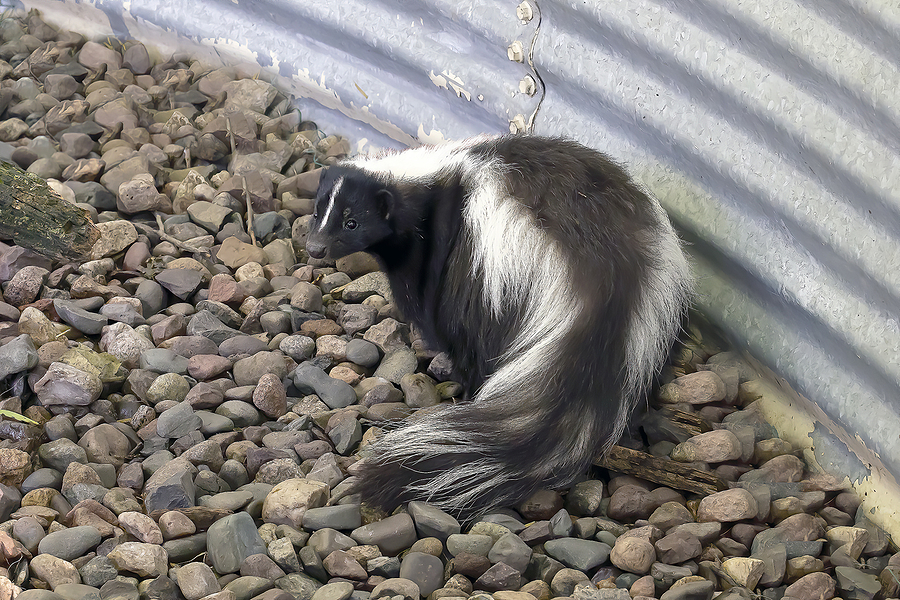Skunks are nuisance animals that can cause damage to your property and pose a threat to your safety. Skunks are known for their ability to spray a foul-smelling liquid as a form of self-defense, and this spray can be very difficult to remove from clothing or skin. Skunks also dig holes in lawns in search of grubs and insects, and their burrowing can damage the roots of your plants. But that’s not all; skunks can also carry and transmit diseases that can harm people and pets.
Continue below to learn more about the dangers of nuisance skunks, and more importantly, how to protect your property and loved ones from skunk threats and damages.

Basic Facts About Skunks
Most people know skunks for their notorious defensive spray, which they use to ward off predators and other threats. But there’s a lot more to these interesting animals than just their smelly defenses! Here are some basic facts about skunks:
Skunks are members of the mustelid family, which also includes weasels, otters, and badgers. There are two main types of skunks – the striped skunk and the spotted skunk.
Skunks are typically black and white in coloration, with the exception of the albino skunk. They have a long, bushy tail, and their fur is thick and oily, which helps to repel water.
Skunks are relatively small animals, weighing between 4 and 10 pounds. They are nocturnal creatures, meaning they are most active at night.
Skunks use their powerful sense of smell to find food. Their diet consists mostly of insects, but they will also eat small mammals, reptiles, amphibians, fruits, and nuts.
Skunks are solitary animals, only coming together to mate. Females give birth to litters of 4-6 kittens in the spring. Baby skunks are born blind and deaf, but they grow quickly, reaching adult size within a few months.
As mentioned before, skunks are best known for their ability to spray a noxious liquid as a form of self-defense. This spray is produced by two glands located near the skunk’s anus, and it can be aimed with accuracy up to 15 feet away!
Skunk Diseases
There are a number of diseases that can be spread by skunks, including rabies and leptospirosis. Skunks are also known to carry the bacteria that cause tuberculosis, and while this disease is not currently widespread in skunks, it is still a concern for public health. In addition, skunks can also be carriers of the West Nile virus, which can be deadly to humans.
Skunks are not the only animals that can carry and transmit these diseases, but they are certainly one of the most commonly known carriers. This is due in part to their habit of spraying their musk, which can contain the bacteria that cause disease. If you come into contact with skunk musk, it is important to wash the area thoroughly with soap and water.
If you suspect that you or someone else has come into contact with a skunk and may have been exposed to one of these diseases, it is important to seek medical attention immediately. Early diagnosis and treatment are critical for the successful treatment of any of these diseases.
What to Do if You Encounter a Skunk
While skunks are generally peaceful animals, they will use their spray as a last resort when they feel threatened. So, if you see a skunk, it’s best to give it some space and admire it from a distance! Never attempt to touch, trap, harm, or kill a skunk. Simply turn around and walk briskly in the other direction. If you have skunks revisiting your property, they could pose threats of damage and disease. In this case, you are encouraged to seek out professional skunk removal and control service in your community.
If you have a skunk on your property, it is important to take steps to control it and remove it safely. Contact Budget Animal Removal at 317-875-3099 for fast and affordable animal removal and control services to get rid of skunks in Indianapolis, Indiana and its surrounding counties. Request a free estimate or advice, today!
Related Posts:
How to Get Rid of a Skunk Problem
Frequently Asked Questions About Nuisance Skunks
How to Remove a Dead Animal From Your House
